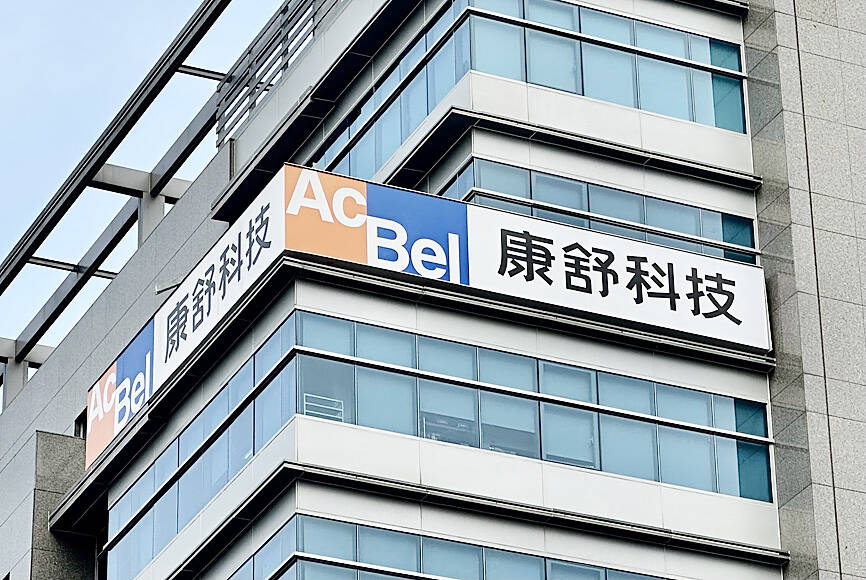Power management solutions provider AcBel Polytech Inc (康舒科技) has fully acquired ABB Ltd’s power conversion division in a cash deal worth US$505 million, it said on Monday.
AcBel said the transaction would create a more resilient and higher margin product portfolio, given the power conversion division’s exposure to the telecom, data center and industrial segments.
The division counts AT&T Inc, Verizon Communications Inc, T-Mobile US Inc, Alphabet Inc’s Google and Hewlett Packard Enterprise Co among its customers, it said.

Photo: Fang Wei-chieh, Taipei Times
All the prerequisites for the acquisition have been fully met including approval from the Committee on Foreign Investment in the United States, AcBel said.
“As the world ushers in the 5G era, industries are accelerating their development to offer innovative applications, giving a boost to the power industry,” AcBel chairman Jerry Hsu (許介立) said in a statement.
“The deep combination with the advanced technology and system solutions from the power conversion unit, AcBel will be able to provide customers with optimal product portfolios amid the growing trend of power efficiency demand from consumers and enterprises,” Hsu said.
AcBel expects strong growth of its power supplies used in electric vehicles this year, a new business that made a small revenue contribution last year.
AcBel’s revenue rose 15.59 percent year-on-year to NT$25.32 billion (US$813.73 million) last year, with 90 percent coming from sales of power supplies. Net profit increased 5.7 percent to NT$636.36 million, or earnings per share of NT$1.23.
The company said that power supplies used in consumer electronics such as desktop and notebook computers accounted for 49 percent of its sales last year, while those for servers, data centers and storage devices contributed 41 percent.
AcBel shares rose 4.09 percent to close at NT$50.9 in Taipei trading yesterday, the highest since June 5, when shares closed at NT$51.2, Taiwan Stock Exchange data showed.

CHIP RACE: Three years of overbroad export controls drove foreign competitors to pursue their own AI chips, and ‘cost US taxpayers billions of dollars,’ Nvidia said China has figured out the US strategy for allowing it to buy Nvidia Corp’s H200s and is rejecting the artificial intelligence (AI) chip in favor of domestically developed semiconductors, White House AI adviser David Sacks said, citing news reports. US President Donald Trump on Monday said that he would allow shipments of Nvidia’s H200 chips to China, part of an administration effort backed by Sacks to challenge Chinese tech champions such as Huawei Technologies Co (華為) by bringing US competition to their home market. On Friday, Sacks signaled that he was uncertain about whether that approach would work. “They’re rejecting our chips,” Sacks

Taiwan’s exports soared 56 percent year-on-year to an all-time high of US$64.05 billion last month, propelled by surging global demand for artificial intelligence (AI), high-performance computing and cloud service infrastructure, the Ministry of Finance said yesterday. Department of Statistics Director-General Beatrice Tsai (蔡美娜) called the figure an unexpected upside surprise, citing a wave of technology orders from overseas customers alongside the usual year-end shopping season for technology products. Growth is likely to remain strong this month, she said, projecting a 40 percent to 45 percent expansion on an annual basis. The outperformance could prompt the Directorate-General of Budget, Accounting and

NATIONAL SECURITY: Intel’s testing of ACM tools despite US government control ‘highlights egregious gaps in US technology protection policies,’ a former official said Chipmaker Intel Corp has tested chipmaking tools this year from a toolmaker with deep roots in China and two overseas units that were targeted by US sanctions, according to two sources with direct knowledge of the matter. Intel, which fended off calls for its CEO’s resignation from US President Donald Trump in August over his alleged ties to China, got the tools from ACM Research Inc, a Fremont, California-based producer of chipmaking equipment. Two of ACM’s units, based in Shanghai and South Korea, were among a number of firms barred last year from receiving US technology over claims they have

BARRIERS: Gudeng’s chairman said it was unlikely that the US could replicate Taiwan’s science parks in Arizona, given its strict immigration policies and cultural differences Gudeng Precision Industrial Co (家登), which supplies wafer pods to the world’s major semiconductor firms, yesterday said it is in no rush to set up production in the US due to high costs. The company supplies its customers through a warehouse in Arizona jointly operated by TSS Holdings Ltd (德鑫控股), a joint holding of Gudeng and 17 Taiwanese firms in the semiconductor supply chain, including specialty plastic compounds producer Nytex Composites Co (耐特) and automated material handling system supplier Symtek Automation Asia Co (迅得). While the company has long been exploring the feasibility of setting up production in the US to address